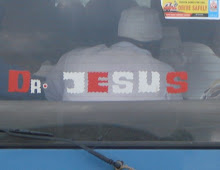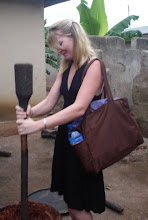We haven’t had a bad day in Ghana. Not that I expected that we would, but I just didn’t know they days would be quite this good. After playing soccer with the children last night at the school, I knew I’d have to spend more time with them. That wish was granted bright and early this morning.
Foggy-eyed and tired, the thirteen of us boarded our big, white bus- a stark contrast from the rusty taxis that scattered around us on the red dirt road in front of our house. Our driver, Steven, wore a bright yellow shirt with DUCKS scrawled in green across the front. He doesn’t speak often, but the shimmer in his eyes is enough to show us his warm heart. We pulled onto the freeway, where hawkers at every stoplight greeted us. The hawkers here sell everything, from newspapers to plantain chips to plastic bags of drinking water. Women carefully balanced silver bowls of mangos on their heads, most with small babies swaddled in wax print fabric tightly to their back. Those obronis interning at newspapers eagerly snatched up copies of the various papers they’d be working at: The Daily Graphic, Accra Daily Mail, Crusading Guide. They shoved 20 pesuas into the pink fingers of the hawkers just as the light changed from red to green. We’re getting better at this!
After about 20 minutes, the bus pulled into the crowded streets of Nima. This impoverished area is the Muslim community we drove through on our tour of Accra. Women stack bags of rice on top of each other in order to conserve space, shouting out to our bus “Cheap rice!” as we crawl by. The pollution was almost too much to bear, and most of us slid our windows shut to protect our lungs. Steven navigated the bus through the crowded streets, slipping between sidewalks packed with vendors. They wore colorful cloth, and the women all wore their hair wrapped in a tight piece of fabric. The Muslims here are mostly Suni, and there are mosques, small and large, on nearly every corner. Steven miraculously found a place to pull the bus over, between a MTN cell phone booth and a woman selling peanuts. We unloaded from the sticky bus, careful not to fall into the gutter of raw sewage that sat in front of us. We filed across a busy roadway, gaining plenty of attention from the locals. Not many tourists visit Nima, so children and adults alike are especially excited to see us. The children are anything but shy—they want to hold your hand, play with your hair, and in any way be close to you.
We meet with a many whose name I can’t quite understand through his thick accent. I do know, though, that he is the headmaster of the local school. He leads our group down a narrow corridor. We disappear behind the cluttered storefronts and find ourselves in a cluster of small homes, each with a front stoop and laundry hanging from the line. People of all ages greet us as we clamor by; babies look at us bewildered, toddlers and young children follow us, and adults nod their heads in a silent gesture of welcome. After our walk down the narrow dirt pathway, we arrive at the school. There is an open dirt lot that I imagine students play football in when they’re not busy learning English, French and traditional dance. Chickens peck the ground in their own sort of traditional dance, scurrying beneath the feet of passersby.
We enter the classroom, and immediately the students are abuzz with delight. The children are seated in desks against the far side of the room, their purple uniforms clean in comparison to the dusty floor. We are greeted like royalty and ushered to the front of the classroom where we sit two by two at small wooden desks. Behind us, backpacks are strewn across the floor, not unlike my own elementary school classroom. This one-room classroom houses students of all ages, but since many families have more than one child and cannot afford 12 years of schooling per child, most children only receive an elementary school education. These children are considered among the lucky ones: There are 60,000 children in Nima and only 25% attend school at all. School fees are $90 per year, yet most families make less than $400 per year making education a very important privilege.
After we’ve taken our seats, the children begin the presentation they’ve prepared for us. They dance the “Akwaaba” dance, welcoming us into their community. I couldn’t take the grin off my face as little boys paraded in front of me, barefoot and happy, swinging their heads around and around in tune to the jimbae. Little girls swung their arms and swayed their hips as they joined the boys, and everyone in the classroom joined in on the song (one in Twi). They performed several other songs and a few poems. One young girl who wants to study in the US read a history of the school, which was founded by the father of the current headmaster. We presented the students with gifts from abroad, including pens, pencils, crayons, erasers, notebooks, and cash. After the presentation, Dennis the drummer played some traditional West African rhythms and we all danced. The children latched onto my white hands and spun me around the room, their natural rhythm putting my moves to shame. We moved the dance outside, where women fanning cooked chicken over open stoves joined in the festivities. When we left, one little girl in a pink dress followed us out. Her family couldn’t afford to send her to school, but she’d crept in to our party and shyly joined hands with the rest of us. She wouldn’t smile, except when we asked if she wanted to go to school. She eagerly nodded her head up and down, her twinkling eyes reflecting the bright sun. We requested that our funds be used for scholarships for children like her, and the headmaster (a friend of our program director) assured us that they would. Feeling pretty blessed, we boarded our white bus once again and headed south for the Abruri Gardens.
Abruri Gardens was amazing. It was filled with trees, plants and flowers that I’d never seen before. Purple violets dangled from vines all along the walkway, where we heard reggae floating softy from the marketplace. We saw the biggest spider I’ve ever seen inside a Ficka tree, and tried not to step on a line of soldier ants as they marched along their path to the queen. We smelled all spice, nutmeg and shea butter and munched on a twig from the cinnamon tree. After our tour, we dined at a restaurant overlooking the gardens and feasted on red red, joallaf rice, fried plantains and chicken.
No matter how hard I tried on that long bus ride to and from Abruri, though, I couldn’t seem to get those children out of my mind. They are so genuine, so trusting and independent despite what we may call “the circumstances.” But what are the circumstances, really? These children were born into a world we call “third world,” that we think of as dirty or uncivilized, and yet young girls and boys here are the hardest working people I’ve ever seen. They don’t hesitate to jump in and help their mother with a heavy load, and they learn the trades of their ancestors. They respect their elders in a way we haven’t seen in our society for a long time, and they treat each other with respect the way we should. I really think that we could learn a thing or two from this place we call “uncivilized” because they are, in fact, among the most civilized and compassionate people I’ve ever known.
After a long day of touring, the obronis of East Legon decided to venture into Accra for a night on the town. Four taxis and numerous cell phone calls later, we arrived as Osekan. Molly, Ryan Jessica and I were in the first cab to arrive in the vacant, dusty parking lot. A security guard greeted us and tried to usher us in to a large, white empty building posing as a bar. Instead, we headed toward the reggae music. Osekan is located on Osu Beach and sits almost on the ocean. We walked down a steep flight of stairs and landed on the ground of arguably the most beautiful bar I’ve ever been to. We sat at a black stone bar, and looking out the ocean is all you can see. There was a large rock slab in front of the bar and we all ventured down to feel the sprays of the warm Atlantic Ocean splash against us. That very ocean turned on us, though, and after we got a little too wet we decided to step back a bit. The night was sent listening to music, laughing with friends and listening to the sounds of waves beat against the coast of Africa.













































No comments:
Post a Comment